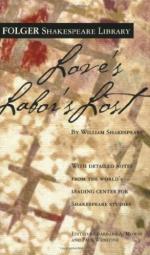|
This section contains 1,413 words (approx. 5 pages at 300 words per page) |

|
SOURCE: “Well, Not Completely Lost,” in The New Republic, Vol. 223, Nos. 4460-4461, July 10 & 17, 2000, pp. 32-3.
In the review that follows, Kauffman reviews Kenneth Branagh's film adaptation of Love's Labour's Lost, criticizing the casting as “dull” in some cases and “dreadful” in others, and protesting that the excising of two-thirds of the play's dialogue was not compensated for by the musical numbers.
William Hazlitt dismissed it: “If we were to part with any of the author's comedies, it should be this.” But Harold Bloom has said: “I take more unmixed pleasure from this play than from any other Shakespearean play.” Kenneth Branagh, if he had read this, might not agree entirely with Bloom but would certainly side with him against Hazlitt. He'd especially agree with a further Bloom comment on one of the characters: “The essence of Berowne is in that insouciant line uttered upon meeting a French lady-in-waiting...
|
This section contains 1,413 words (approx. 5 pages at 300 words per page) |

|


